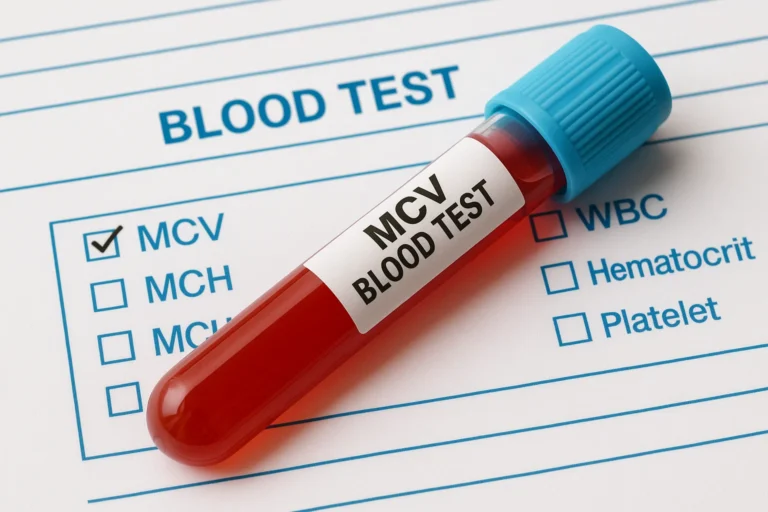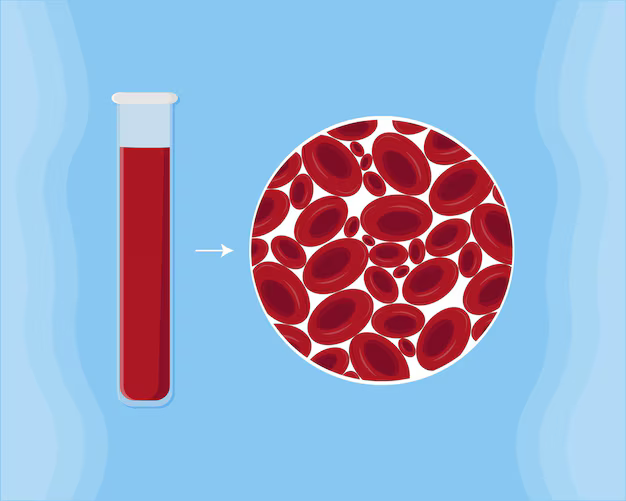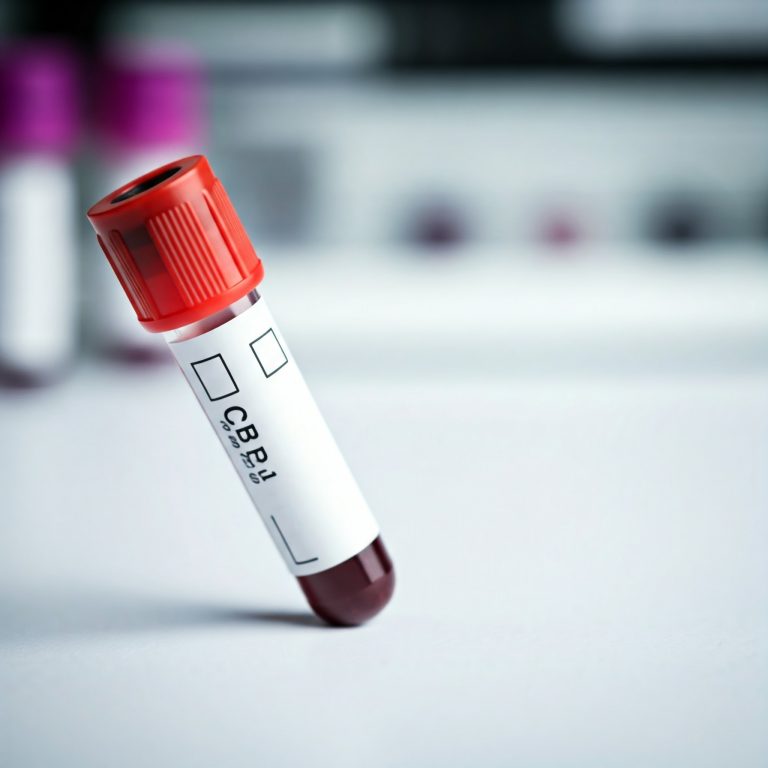Mean Corpuscular Volume (MCV) Blood Test: Results & How It Works
October 10,2025

Ever wondered why a simple blood draw can reveal so much about your health? One unsung hero inside the complete blood count (CBC) is the MCV blood test. MCV stands for mean corpuscular volume. Basically, it measures the average size of your red blood cells.
Sounds tiny and technical, right? But here’s the thing: that little number helps doctors figure out whether you might have anemia, vitamin deficiencies, or other blood-related conditions. Think of it as your red blood cell’s dress size. It’s not the full story, but it gives important clues about what’s going on inside your body.
What Is MCV (Mean Corpuscular Volume)?
So, what is MCV exactly? It’s short for mean corpuscular volume or mean cell volume, and it measures the average size of your red blood cells (RBCs).
- If your MCV test shows your cells are too small → it may signal iron deficiency anemia or inherited blood disorders like thalassemia.
- If your cells are too large → it might point to vitamin B12 or folate deficiencies, liver disease, or certain autoimmune conditions.
That’s why the MCV blood test is almost always ordered as part of a CBC. It’s not a standalone test but a puzzle piece that works alongside hemoglobin, hematocrit, and other indices.
Why Would You Need an MCV Test?
Doctors often order an MCV blood test during:
- Routine checkups (as part of a CBC).
- When you have symptoms of anemia, such as:
- Fatigue and weakness
- Dizziness or headaches
- Shortness of breath
- Irregular heartbeat
It’s also helpful in monitoring chronic illnesses (like kidney disease) that may affect red blood cell health.
How the MCV Blood Test Works
The procedure is as standard as any blood draw:
- A healthcare provider inserts a small needle into a vein in your arm.
- A sample is collected into a vial and analyzed by an automated blood counter.
- Your MCV value shows up on your CBC report in femtoliters (fL), a unit of volume so tiny it measures cells.
No special prep is needed unless you’re also doing other tests that require fasting.
Understanding the MCV Normal Range
For most adults, the MCV normal range is about 80–100 femtoliters (fL).
Here’s what different results can mean:
Low MCV (Microcytic Anemia)
- Cells are smaller than normal.
- Common causes: iron deficiency, thalassemia, and chronic disease inflammation.
High MCV (Macrocytic Anemia)
- Cells are larger than normal.
- Possible causes: Vitamin B12 or folate deficiency, liver disease, long-term alcohol use, or thyroid problems.
Normal MCV but Still Anemia?
Yes, it happens. Blood loss, kidney disease, or bone marrow disorders can cause anemia without changing MCV. That’s why doctors always interpret your MCV with other blood indices.
Risks and Aftermath
The MCV blood test is safe. The only minor risks are a quick sting, mild soreness, or a small bruise where the needle went in. Most people feel fine right after.
What Happens If Results Are Abnormal?
If your MCV test falls outside the mcv blood test normal range, don’t panic. One abnormal value doesn’t automatically mean something serious. Your doctor will:
- Look at your full CBC panel.
- Review your medical history and symptoms.
- Possibly order further tests (iron studies, vitamin B12, folate, thyroid tests, or bone marrow evaluation).
Remember: MCV is a guide, not a diagnosis.
Conclusion: Why MCV Matters
The mean corpuscular volume may look like just another number on your CBC report, but it’s a powerful clue about your overall health. Staying within the MCV normal range means your red blood cells are the right size to carry oxygen efficiently. Out-of-range results? That’s your body’s way of saying: “Hey, let’s look a little deeper.”
If you’re feeling unusually tired or dizzy, ask your provider: “What is my MCV, and what does it mean for me?” That one question could unlock important answers about your health.
FAQs: MCV Blood Test
1. What is MCV in a blood test?
MCV stands for mean corpuscular volume, which measures the average size of your red blood cells.
2. What is the normal range for MCV?
The typical mcv normal range for adults is 80–100 fL.
3. What causes a low MCV?
Low MCV usually indicates microcytic anemia caused by iron deficiency, thalassemia, or chronic disease.
4. What causes a high MCV?
High MCV often points to macrocytic anemia, linked to vitamin B12 or folate deficiency, alcohol use, thyroid issues, or liver disease.
5. Do I need to prepare for an MCV test?
No. The MCV blood test is part of a routine CBC and doesn’t require special preparation.
6. Can MCV alone diagnose anemia
No. It’s a helpful marker but must be interpreted with other tests like hemoglobin and iron studies.
References
- Cleveland Clinic – MCV Blood Test: What It Means
- MedlinePlus – MCV Test Overview
- Mayo Clinic – Complete Blood Count (CBC)
- Medscape – Normal Ranges of MCV
- NIH / NCBI – Blood Test Safety









Leave a Reply